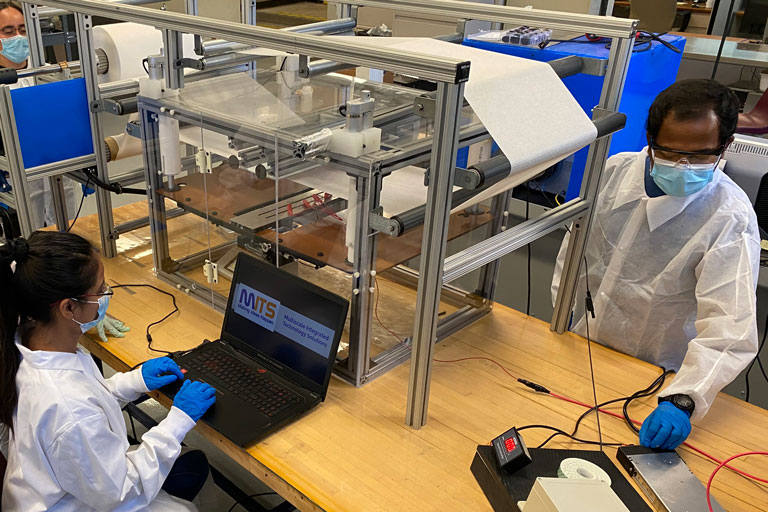July 2020
In the past four months, IU researchers have played critical roles in the ongoing fight against COVID-19. The daunting challenge seemed to happen overnight: stop what you are doing, rethink how you are doing it, and adapt – now. IU research and creative activities quickly focused on ways to detect, treat, manage, respond to, and ultimately eradicate the threat of the deadly coronavirus. Many researchers pivoted to apply their knowledge to our new public enemy number one: COVID-19.
To help support this important work and position it for future external support, IU's Office of the Vice President for Research, led by Vice President Fred H. Cate, partnered with schools and campuses to provide modest funding support to 26 research initiatives.
“In the unprecedented nature of this time, we are happy to answer the imminent need to empower IU faculty to address the COVID pandemic,” said Cate. "I continue to be overwhelmed by the creativity and commitment of IU researchers in the fight against COVID-19 as we strive to better understand its local and global impacts.”
The funded projects range from efforts evaluating distance education in K-12 and university settings to understanding the impact of increased self-isolation on older adults and other vulnerable populations, and from assessing the impact of executive orders on the spread of coronavirus to fostering entrepreneurial responses to meet the needs of hospitals and first responders.
Progress has been swift, with journal articles, surveys, and essential research continuing in labs, along with existing and new technologies harnessed in the fight.
Some projects have used the seed funding to expand and secure additional funding. Jacek Kolacz, assistant research scientist at The Kinsey Institute, used the seed funding to start a longitudinal study with a nationally representative sample to look at how trauma histories and body stress responses predict individual changes in mental health.
"With the starting funds, we were able to secure another $270,000 for the project from the Dillon Fund. This lets us expand the project to 600 residents, who we are tracking over four time points over the course of several months," Kolacz said. "We are still in the early stages of data collection and will likely have results in early fall. Our research group is deeply thankful for the VPR seed funding, which was crucial to us landing the larger grant."
While the pandemic rages, issues of injustice and inequality continue to plague our nation and our world, and IU centers, institutes, and individual faculty members are exploring myriad aspects of race, ethnicity, and inequality in relation to the pandemic including creating inclusive remote work environments during the pandemic and the impact on vulnerable populations who are struggling with issues such as energy insecurity.
And with masks playing an important role in coronavirus response, one project led by researchers at IUPUI's Integrated Nanosystems Development Institute is aimed at solving a problem very relevant today: making reusable face masks safer and more comfortable for daily use.
Mangilal Agarwal and Hamid Dalir are applying a patented technology developed at IUPUI to manufacture reusable face masks using copper, a metal often found in the production of high-touch objects like doorknobs and handles. Their goal is to improve filter performance by trapping and disabling airborne virus particles.
"We wondered how we could use our existing technology to turn something used in ancient times, like copper, into protection against COVID-19," said Mangilal Agarwal, director of the Integrated Nanosystems Development Institute and professor of mechanical and energy engineering. "Any virus sitting on the surface that comes in contact with copper will be killed because of the antiviral properties."
Agarwal and Dalir disclosed their technology to the Indiana University Innovation and Commercialization Office and are looking to commercialize it through their startup. They plan to work with local companies manufacturing COVID-19 supplies under the Defense Protection Act.
And thanks to support from the state of Indiana, many of IU's essential research activities have continued, with record numbers of research proposals for federal and external funding submitted. Additional examples of essential research include an innovative electroceutical fabric to eradicate the coronavirus on contact and a promising effort to develop a vaccine for children and infants.
Due to great response, IU's COVID-19 rapid response grant program reached its cap and will no longer be reviewing new funding requests. Watch for more on the efforts of IU researchers and outcomes of the 26 funded projects in IU's COVID-19 update newsletter as well as the Research Impact website.


